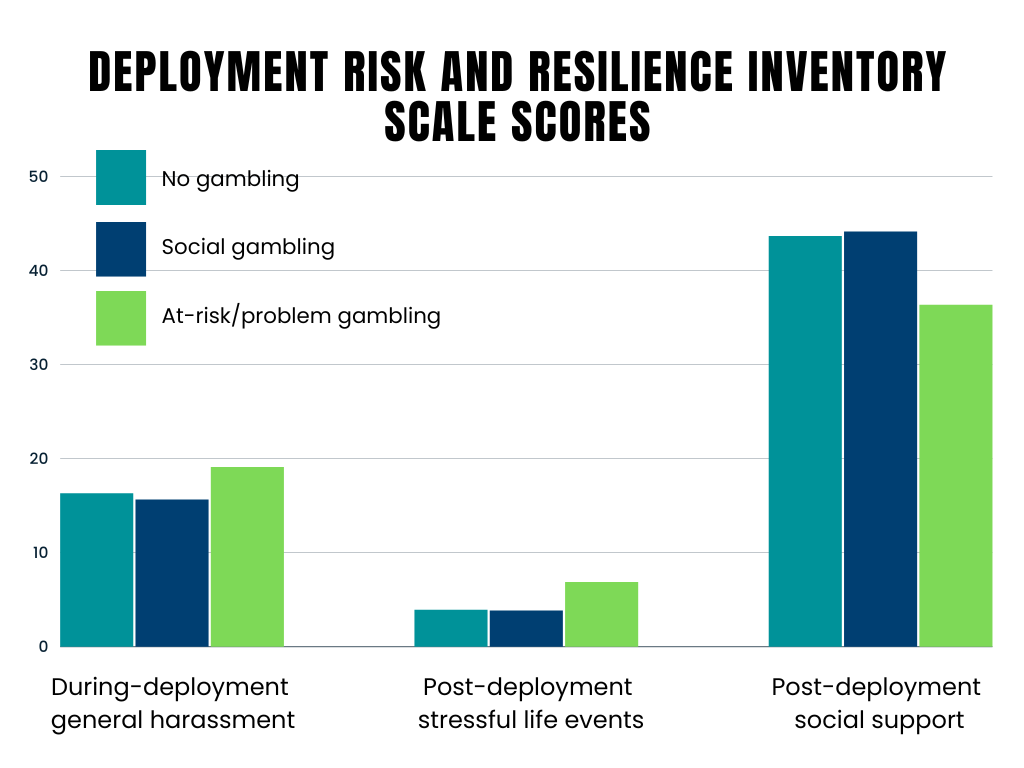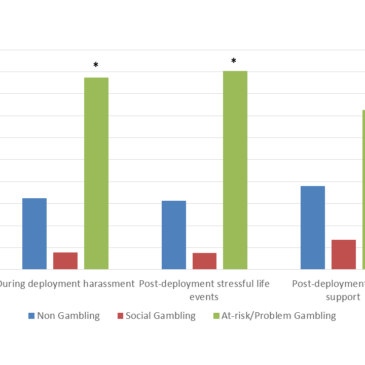Since the fall of 2001, almost 2 million US soldiers have served in combat in Iraq and Afghanistan. Those who have served in combat are at increased risk for psychological and cognitive problems, sometimes referred to as the “invisible wounds of war.” It should come as no surprise, then, that military veterans who have served in combat also are at an elevated risk for problem gambling. This week, The WAGER reviews a study by Seth Whiting and his colleagues which examined if veterans’ military experiences are associated with problem gambling.
What was the research question?
Are the stress, mental health problems, and trauma experienced during military service associated with problem gambling?
What did the researchers do?
Seth Whiting and his colleagues conducted secondary data analysis using information collected from 738 US military Veterans that participated in the Survey of the Experiences of Returning Veterans (SERV) Study. The researchers asked about their demographic information, psychiatric health, gambling behavior, and military service history including non-sexual harassment during deployment, post deployment stressors such as violent encounters and legal or financial issues, and post deployment support such as friends or family as outlets for talking about deployment experiences or assistance with daily living.
What did they find?
Among the veterans surveyed, 4.2% reported at-risk or problem gambling, 43.0% reported gambling with 1 or fewer harm consequences, what the authors labeled social gambling, and 52.9% reported no gambling during the past 12 months. Veterans who reported at-risk and problem gambling were more likely to report experiencing PTSD, panic disorder, substance dependence, and depression compared to veterans who reported no or social gambling. Veterans who reported at-risk and problem gambling or social gambling were more likely to report a Traumatic Brain Injury compared to veterans who did not gamble. Compared to the other two groups, veterans who reported at-risk and problem gambling had higher scores for both non-sexual harassment during deployment and post deployment stressors, and scored lower for post deployment support (Figure).

Figure. Military service experience by gambling behavior. Figure created from Whiting et al., 2016. Click image to enlarge.
Why do these findings matter?
US military bases across the globe provide slot machines as a form of recreation for service members. Knowing that veterans are at an increased risk for gambling-related problems, the Department of Defense should consider implementing and evaluating responsible gambling tools to help service members monitor their gambling behavior. The Department of Defense should screen active duty service members and veterans at high risk for gambling problems using the BBGS or a similar screening tool and ensure the VA is well equipped to address these problems.
Every study has limitations. What about this one?
Researchers from the SERV study used a mix of recruiting methods that limits our ability to generalize this study’s findings to all military veterans. The results of this study come from the baseline survey of the SERV study. The cross-sectional study design does not allow researchers to assess causation.
For more information:
Need help? Veterans can access a variety of resources for dealing with mental health issues here. If you or a loved one is struggling with gambling or drug problems, please visit our addiction resources page.
— John H Kleschinsky
What do you think? Please use the comment link below to provide feedback on this article.





David brode August 17, 2016
I am not sure by the survey if it included Vietnam vets.if it did,what percentage was Vietnam vets.also did it include combat vets with and without combat ptsd.i can tell you first hand the of Vietnam vets with combat ptsd will have higher propensity to gamble than non vets without ptsd.the percentages are far worse than the statistics tell.
Brian Bissonnette January 22, 2019
Nice article with very useful information. It is true somewhere because I have seen many of my colleagues having the same problems. Thanks for this post.